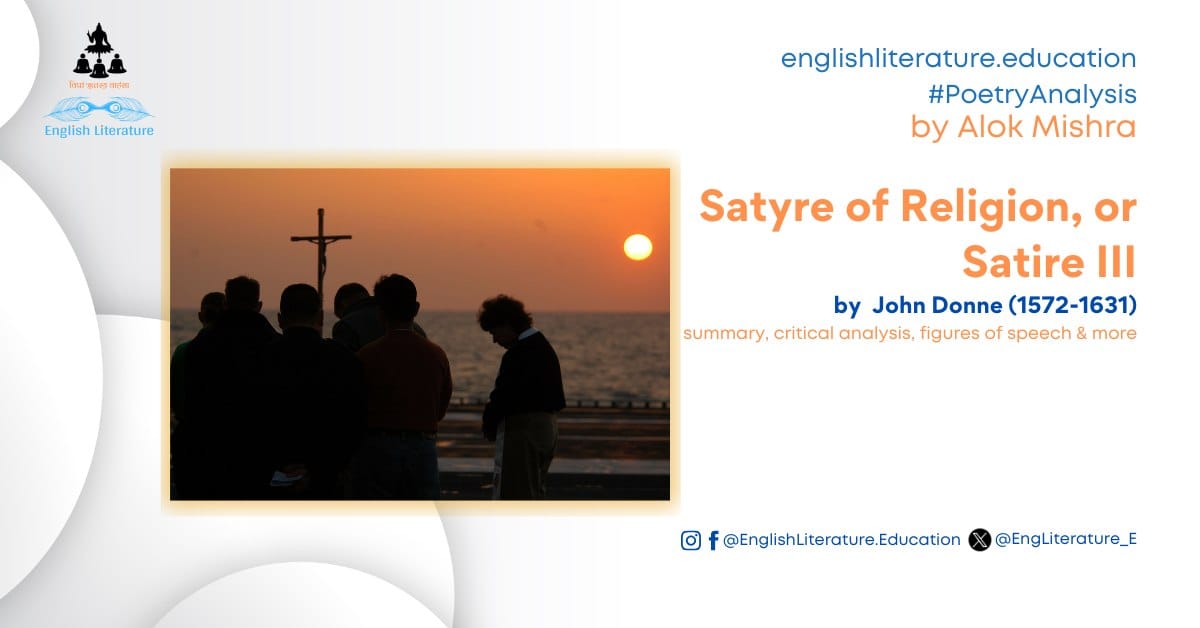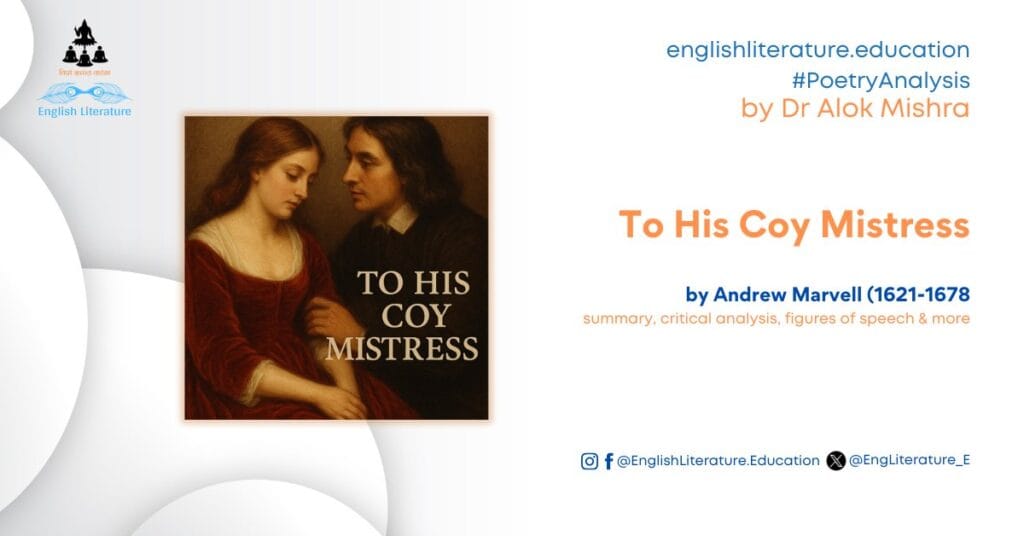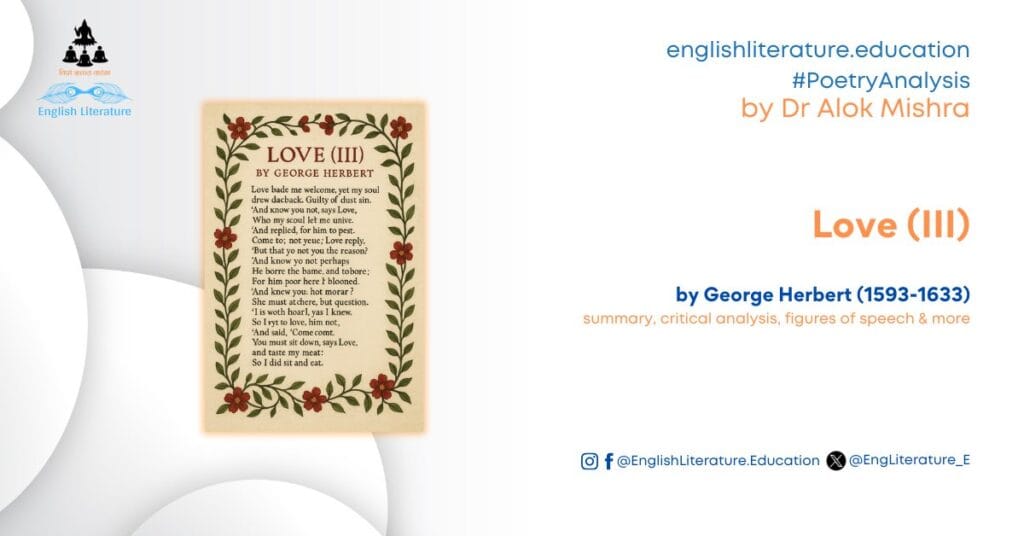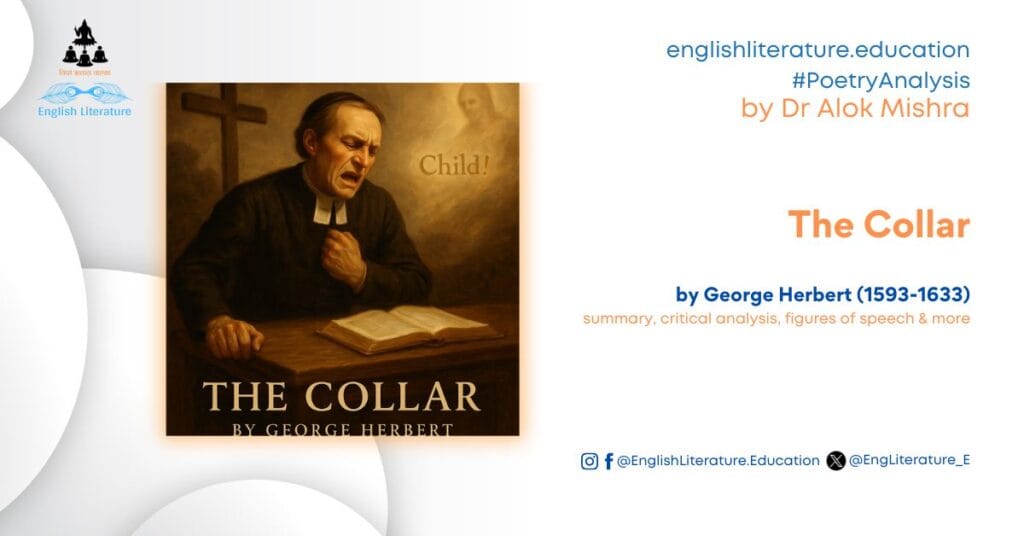Lines 67–77:
“Graccus loves all as one, and thinks that so
As women do in divers countries go
In divers habits, yet are still one kind,
So doth, so is Religion; and this blind-
ness too much light breeds; but unmoved, thou
Of force must one, and forc’d, but one allow,
And the right; ask thy father which is she,
Let him ask his; though truth and falsehood be
Near twins, yet truth a little elder is;
Be busy to seek her; believe me this,
He’s not of none, nor worst, that seeks the best.”
Explanation:
In these lines, Donne presents another figure, Graccus, who represents a different but equally flawed approach to religion, an uncritical universalism. Unlike Graius, who passively accepts the religion imposed upon him, or Phrygius, who cynically rejects all, Graccus embraces every religion as equally valid, believing that their differences are merely superficial.
Graccus compares religious diversity to the variety of female dress across cultures: “As women do in divers countries go / In divers habits, yet are still one kind.” For him, religions are like national costumes, different in appearance, but all essentially the same. This relativism, Donne argues, is not tolerance but confusion. The line “this blindness too much light breeds” is paradoxical: Graccus believes he sees everything, but in seeing too much, he sees nothing clearly. His “light” becomes “blindness”, a failure to discern truth from error.
Donne’s speaker counters this intellectual passivity by insisting that a choice must be made: “Of force must one, and forc’d, but one allow, / And the right.” In other words, even if religious identity is often culturally inherited and imposed, each person still bears the responsibility to discern and choose what is true. Donne challenges inherited ignorance with generational accountability: “Ask thy father which is she, / Let him ask his.” While tradition may aid inquiry, it is not sufficient in itself; each must seek for himself.
The striking line, “Though truth and falsehood be / Near twins, yet truth a little elder is,” captures the difficulty of distinguishing true faith from falsehood. They may resemble one another, twins in appearance, but truth retains a moral and historical primacy. It is older, more foundational, and ultimately discernible to the diligent seeker.
The final lines exhort the reader to active spiritual inquiry: “Be busy to seek her,” says the speaker; her, referring again to religion personified. The line “He’s not of none, nor worst, that seeks the best” defends the sincere seeker. Even if one does not yet possess the truth, the very act of seeking is ennobling. This is one of the few moments in the poem where Donne offers encouragement without satire.
Critical Commentary:
This passage marks a subtle shift in the tone of Satire III. Having exposed the failings of others, those who blindly conform, skeptically withdraw, or relativistically embrace all, Donne now turns to the reader (or himself) with a sober exhortation to earnest moral and theological effort. The satire gives way to a deeply personal appeal for spiritual responsibility.
Graccus is perhaps the most modern of Donne’s types. His indiscriminate acceptance of all religions in the name of universality reflects a form of liberal relativism that Donne finds troubling. It is not religious tolerance that he condemns, but the failure to discern. Donne is no friend to dogmatism, but neither does he accept a vague syncretism. The challenge of identifying true religion is complex; truth and falsehood are “near twins”, but not impossible.
Donne’s moral logic becomes clearest here: truth is singular, but the journey toward it is plural and personal. To be wrong through passive acceptance or negligent relativism is worse than being unsure through honest seeking. Thus, this passage functions as a call to spiritual courage and intellectual labour.
Poetic Devices:
Extended Metaphor: Graccus’s belief is likened to women in different “habits,” symbolising superficial religious differences.
Paradox: “Blindness too much light breeds” captures the danger of excessive openness that leads to confusion.
Anaphora: The repetition of “ask” in “Ask thy father… Let him ask his” underscores generational responsibility and inquiry.
Personification: Truth is again personified as a woman, reinforcing the allegorical imagery of religion as a beloved or bride.
Antithesis: “Truth and falsehood be / Near twins” Donne explores the fine line between appearances and essence.
Comparison with Other Poets:
This passage distinguishes Donne from both the sectarian extremes of his contemporaries and the purely rational scepticism of later thinkers. In contrast to someone like George Herbert, who writes from a position of spiritual resolution and ecclesiastical comfort, Donne’s speaker remains the seeker: uncertain, burdened, but determined.
The call to “seek the best” also recalls the moral optimism of Augustine’s Confessions, a belief that a sincere search for truth, even amid confusion, is spiritually redemptive. Similarly, Blaise Pascal, in the following century, would insist that the act of seeking God is itself an argument for faith.
In satirical spirit and psychological realism, however, Donne still owes more to Montaigne and Erasmus than to any systematic theologian. Like them, he recognises the complexity of conscience and the moral peril of laziness, whether cloaked in conformity, scepticism, or relativism.
Lines 78–90:
“To adore, or scorn an image, or protest,
May all be bad; doubt wisely; in strange way
To stand inquiring right, is not to stray;
To sleep, or run wrong, is. On a huge hill,
Cragged and steep, Truth stands, and he that will
Reach her, about must and about must go,
And what the hill’s suddenness resists, win so.
Yet strive so that before age, death’s twilight,
Thy soul rest, for none can work in that night.
To will implies delay, therefore now do;
Hard deeds, the body’s pains; hard knowledge too
The mind’s endeavours reach, and mysteries
Are like the sun, dazzling, yet plain to all eyes.”
Explanation:
In this pivotal passage, Donne moves beyond satirical portraits and fully embraces a serious philosophical and spiritual exhortation. He addresses the reader directly, no longer describing others’ religious errors but urging personal responsibility and moral effort in the quest for truth.
The initial line presents a spectrum of religious practices—“to adore, or scorn an image, or protest”—which may each be spiritually problematic. The point is not to uncritically adopt or reject any particular form of worship but to “doubt wisely.” Doubt, often seen as a vice, here becomes a virtue—if exercised correctly. To stand in a posture of inquiry, even uncertainty, is not to be lost. Donne writes, “To stand inquiring right, is not to stray.” This line validates sincere questioning as a sign of spiritual health, so long as it does not lapse into sloth or cynicism.
In sharp contrast, “To sleep, or run wrong, is”—stagnation and misdirection are the true dangers. Donne then introduces the image of Truth as a woman standing atop a “huge hill, / Cragged and steep.” The climb is arduous and indirect—one must go “about and about.” The path to truth is not straight or immediate, but laborious and uncertain. The metaphor suggests that spiritual enlightenment requires perseverance, patience, and humility.
Donne warns that this search is constrained by time. “Strive so that before age, death’s twilight, / Thy soul rest.” The metaphor of death as twilight and the inability to “work in that night” recalls Christ’s warning in John 9:4: “The night cometh, when no man can work.” Thus, the urgency of the quest is emphasised—truth must be sought in life, before it is too late.
The next lines press the reader further: “To will implies delay.” Mere intention is insufficient. One must act decisively and immediately. The pursuit of truth demands both physical and intellectual exertion: “Hard deeds” require bodily endurance, while “hard knowledge” taxes the mind. Donne rejects the idea that truth is easily won—it demands effort.
He concludes with a final paradox: “Mysteries / Are like the sun, dazzling, yet plain to all eyes.” Spiritual truths are overwhelming—“dazzling”—but also universally accessible—“plain.” The challenge lies not in their obscurity but in our capacity to receive them.
Critical Commentary:
This passage represents the theological and philosophical climax of Satire III. Having outlined the major pitfalls in the religious landscape, we can identify nostalgia, austerity, passivity, cynicism, and relativism, Donne now articulates his own model for spiritual life: earnest, intelligent, and morally courageous pursuit of truth.
Donne does not resolve the question of which religion is true. Rather, he stresses the necessity of seeking truth with sincerity and discipline. His is a via media between sectarian arrogance and relativistic sloth. To “doubt wisely” is a powerful formulation: doubt is not condemned but elevated as a tool of discernment. Faith is not incompatible with inquiry; in fact, it may require it.
The image of the hill, with its “cragged and steep” terrain, encapsulates Donne’s understanding of truth as hard-won and elevated. This is a conscious counterpoint to those earlier in the satire who chose paths of least resistance. The repetition of “about must and about must go” reinforces the notion of non-linearity; truth is rarely found by a single dogmatic path but through persistent, circuitous struggle.
The existential urgency of the lines “before age, death’s twilight” underscores Donne’s conviction that time is morally significant. The soul must be prepared, not at leisure but through sustained effort, lest death overtake it unready.
Finally, the metaphor of the sun captures the paradox of revelation: truth may be difficult to endure, yet it is ultimately accessible. The fault lies not in its invisibility, but in our unreadiness to see.
Poetic Devices:
Antithesis: “To stand inquiring right, is not to stray; / To sleep, or run wrong, is.” Contrasts the value of active doubt with the danger of spiritual sloth or error.
Metaphor: Truth as a woman atop a “cragged and steep” hill—representing moral and intellectual difficulty.
Biblical Allusion: “None can work in that night” recalls John 9:4, linking Donne’s appeal to scriptural authority.
Paradox: “Mysteries / Are like the sun, dazzling, yet plain to all eyes.” Truth is simultaneously overwhelming and self-evident.
Anaphora: “Hard deeds… hard knowledge” emphasises the dual burden of bodily and mental discipline.
Imagery: The “huge hill,” “death’s twilight,” and “sun” evoke a spiritual topography rich with struggle and illumination.
Comparison with Other Poets:
Donne’s insistence on the difficulty of truth and the dignity of doubt sharply distinguishes him from the more devotional certainties of George Herbert or the prophetic idealism of John Milton. Where Milton might extol the purity of chosen truth, Donne lingers in the ambiguity of the search itself. The metaphor of the hill echoes Dante’s Divine Comedy, where the soul must also ascend a steep mountain to reach beatitude—suggesting a shared conception of salvation as a journey through moral effort. Donne’s praise of doubt also prefigures the epistemological humility of later thinkers like John Henry Newman, whose Grammar of Assent would affirm the dignity of individual conscience and the necessity of inquiry in faith. In style and method, Donne again aligns with Montaigne, valuing introspection, moral earnestness, and the limits of reason—while his poetic compression and metaphysical intensity remain unmistakably his own.




